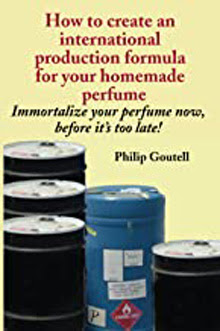 If you are developing a perfume to sell, at some point you have to stop developing and start selling. Or do you? Can you continue to develop your fragrance AFTER you've started to sell it?
If you are developing a perfume to sell, at some point you have to stop developing and start selling. Or do you? Can you continue to develop your fragrance AFTER you've started to sell it?I recently introduced a fragrance I'd been working on since last April. ("Manama", at FrankBush.com) At this point it was finished. Now, in my mind, the only work to be done is to produce it in a larger quantity (which I am doing now) and sell it. Simple.
But life isn't always so simple, not when you have an open mind and take seriously helpful suggestions from knowledgeable friends whose feedback just MIGHT guide you toward IMPROVING a fragrance you consider quite good, even when these respected "coaches" AGREE that you have put together a really nice fragrance -- perhaps the best you've ever done. (I shared this feeling they had about Manama.)
I've done this before -- with Blackberry (FrankBush.com) even AFTER it was finished. I tested some ideas that were given to me and, while I respected them, they were rejected because I liked Blackberry just the way it was -- and I still do.
My post introduction experiments with Manama were interesting, educational, and food for thought for future projects. But the Manama formula has stayed the way it was on the day I pronounced it "finished."
It may come as news to some, but long lived, famous fragrances have been tinkered with over the years. this happens for several reasons. The first and most urgent is when a traditional raw material falls under suspicion (rightly or wrongly) and its use becomes restricted (or politically incorrect.) A substitute is now called for that can be used in such a way that the odor impression of the fragrance is unchanged.
A second reason for tinkering with a proven formula would be when one or more ingredients becomes prohibitively costly -- or simply unavailable in the quantity needed. The perfumer turns to the research chemist in the hopes of obtaining a less expensive, more available, synthetic substitute with the result often being the salvation of an endangered species while the product suffers only the slightest quality downgrade, so slight that even the most sensitive noses would be unlikely to notice the difference.
Finally there is the tweaking of a formula to bring it "up to date," to modify it to meet contemporary tastes and trends. This was the reason for the suggestions I received on Manama. A friend, who is enthusiastic about very modern fragrances that use the latest synthetics from research chemistry, suggested a few substitutions that might give Manama more of a state-of-the-art, cutting edge, feeling.
I would have been an arrogant fool NOT to have experimented with these suggestions. I did and I experienced the effect he had described to me. But I didn't make the changes. Not to Manama. I prefer this fragrance just the way it is.
But, going forward, I have already begun to use some of these ideas, and some new raw materials I had not encountered before, in my work to finalize ANOTHER fragrance I'm working on. And, as a result of these ideas and materials, this other fragrance is showing improvement. Very nice improvement.
Finally there is a new fragrance on my drawing board I'm developing to impress a particular person who has a particular market in mind. The suggestions and aroma materials I rejected for Manama will be the STARTING point of this new fragrance.
Yes, you can keep developing a fragrance AFTER you've started to sell it. The results might be a subtle improvement -- or they might be a whole new fragrance.


No comments:
Post a Comment